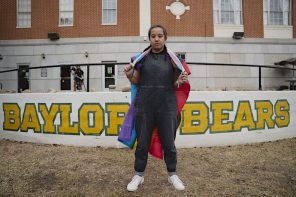When he walks across the stage to receive his diploma on Saturday, 17-year-old Wisconsin high school senior Ashton Whitaker will do so knowing that his name will go down in history connected to a landmark ruling that affirms trans students’ right to access facilities that correspond with their gender identity.
When I asked the teenager how it feels to have his name attached to such a historic decision, Whitaker was level-headed. “It’s just pride at this point,” he said. “I’m so honored to be a part of something like this, despite what hardships I may have gone through. It’s nice knowing that this will definitely be a beacon for other trans kids, and other people in the community, to look to as a source for hope.”
That source for hope came in the form of a three-judge panel on the Seventh Circuit Court of Appeals’ unanimous ruling handed down Tuesday, declaring that Title IX and the U.S. Constitution’s Equal Protection Clause guarantee Whitaker—and by extension all trans students in the Seventh Circuit—equal access to school facilities that correspond with their gender identity.
The ruling marks the first time a federal appeals court has made this determination on such sweeping grounds, attorneys who argued the case explained on a Tuesday press call organized by the Transgender Law Center, which represented Whitaker.
“This decision is the first time a federal appeals court has found that Title IX, as a matter of statutory law, protects transgender students from discrimination in schools,” explained co-counsel Joseph Wardenski, who argued the case before the Seventh Circuit. “And we think that it sends a clear message to schools across the country that they should be treating transgender students equally and with dignity.”
Choking back tears, Whitaker’s mother, Melissa, said that she was “elated” to step back from the constant worry she’s felt about the discrimination her son was facing. “I’m so proud to say how much I love him, and that I’m going to have a biomedical engineer on my hands—not someone who has to keep fighting for who he is,” she said. She added that her son will start classes at the University of Wisconsin–Madison in the fall.
Tuesday’s unanimous decision keeps in place a September injunction ordered by a lower court, barring the school district from enforcing the gender essentialist policy it implemented after Whitaker began using the boys’ restroom at school last year. The defendant, Kenosha Unified School District, could appeal the decision to the full Seventh Circuit or the U.S. Supreme Court, but attorneys for the plaintiffs are hopeful that, with two rulings in their favor and Whitaker’s imminent graduation, the district will let Tuesday’s ruling stand.
If that happens, presiding case law regarding trans students’ access will read like it was written by LGBT advocates, who have long pointed to growing legal precedent that suggests Title IX’s prohibition on sex discrimination extends to discrimination based on gender identity. That precedent could prove critical as similar cases regarding trans student access advance in the Fourth and Sixth Circuits, attorneys on Tuesday’s call explained.
As Judge Ann Claire Williams said in her ruling for the court:
A policy that requires an individual to use a bathroom that does not conform with his or her gender identity punishes that individual for his or her gender non‐conformance, which in turn violates Title IX.
As BuzzFeed‘s Chris Geidner noted, the ruling also emphatically rejects the transphobic (and unfounded) concerns about “safety” and “privacy” advanced by the Kenosha Unified School District, applying, for the first time, heightened scrutiny to policies that regulate a student’s access based on their gender identity.
Although the school district tried to claim that its policy requiring students to use the facilities that correspond with their sex assigned at birth treated male and female students the same way—thus satisfying the Equal Protection requirement—the court would have none of it.
“This is untrue,” Williams wrote. “Rather, the School District treats transgender students like Ash, who fail to conform to the sex‐based stereotypes associated with their assigned sex at birth, differently.”
That simple but powerful affirmation has clearly resonated with Whitaker, who spoke with noticeable excitement in his voice and a keen recognition of his place in the ongoing, unfinished fight for LGBT rights.
“I am so excited to keep moving forward and keep working on civil rights like this,” Whitaker said in Tuesday’s press call. “Having this [victory] under my belt, it tells me and it tells other people who I may be working with, or even strangers, that putting your mind to it and not giving up really pays off in the end, regardless of the fact that there will be hardship. … So I’m just very excited for my future now.”





